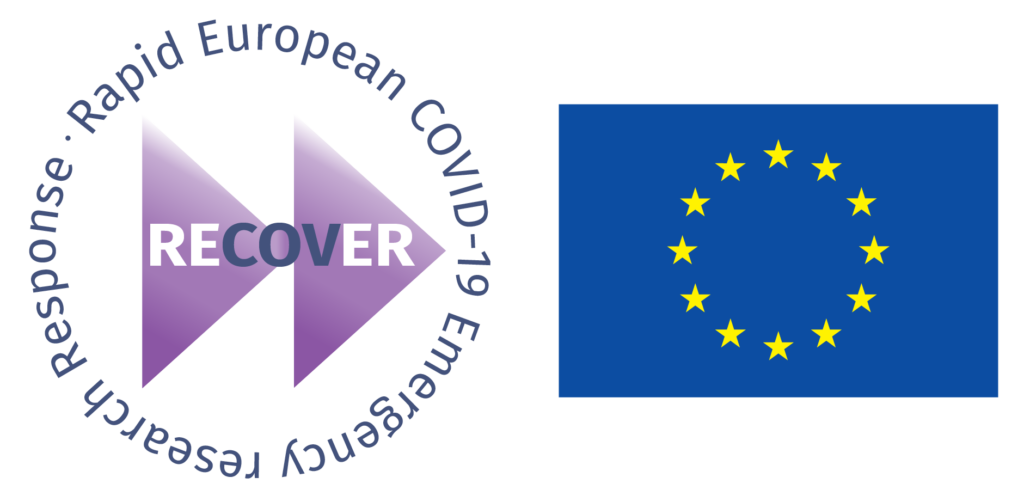14 September 2020
Social science research has been embedded through cross cutting studies across the RECOVER work packages. These studies provide social and behavioural insights into patient and clinician experience of providing and receiving care during the COVID-19 pandemic.
To better understand what working on COVID-19 during the pandemic entails, we have interviewed RECOVER Social Science Team Leads Nina Gobat, Sarah Tonkin-Crine and Sibyl Anthierens about their research and day-to-day activities.
What is your role within RECOVER/in the COVID-19 pandemic and what it entails?
Nina Gobat
I am a social scientist and a Senior Researcher at the University of Oxford. I have been working on epidemic research preparedness and response, and as a part of European collaborations for some time now and was closely involved in our response to COVID-19 which led to RECOVER, PREPARE’s Response Mode 3.
Sarah Tonkin-Crine
I am a Health Psychologist and a Senior Researcher at the University of Oxford. I have worked on European collaborations for quite some time and my primary research interest is clinician behaviour change in the context of infections research. Sibyl and I have worked together for the past 10 years doing multi-country qualitative studies, which is the expertise we are bringing to RECOVER.
Sibyl Anthierens
I am a sociologist and Associate Professor at the University of Antwerp. Our expertise is qualitative research, but we are also looking at ways to triangulate quantitative and qualitative data and looking for links and synergies across the social science work packages in RECOVER. We are also looking for different research opportunities to work with the epidemiologists and with the clinical data to see how we can put it in a social context. Part of our tasks include capacity building for our younger researchers within RECOVER’s social science work who are doing an incredible job at the moment analysing the vast amount of the data that we are collecting.
Could you tell us a little bit about the project/work you’re involved in?
A lot of our work includes coordination and strategic direction. This involves looking for entry points where social and behavioural sciences can bring added value to some of the more clinical or biomedically oriented work within RECOVER. Adapting to shifting contexts is an enduring feature of qualitative research, even if this particular context is unprecedented in scale. Different projects will require different adjustments, different ways of collecting data or new ways of analysing data to be able to produce output quickly and inform policy. Qualitative research is well-positioned to enable the reworking of methods, methodologies and theoretical frameworks to new situations.
Within work package 1 a public survey is being conducted that aims to understand the way that members of the public in Europe think about and understand science. By learning how people understand or misunderstand science, we can make sure we are shaping and sharing accurate messages about our research with the public. We have been analysing twitter data to see how people are perceiving the origins of the virus, possible vaccine etc. What we are seeing is that the way people think about treatments is influenced by their politics. For example, conversations about hydroxychloroquine are more prevalent in individuals with a more conservative political approach.
Within work package 2 we are doing a multi-country qualitative study We are looking at how physicians have responded to the pandemic on the ground and how patients who are presenting in primary care have experienced healthcare in the pandemic. This is important to inform policy about how primary care can be best supported and by understanding experiences and behaviours we can be better prepared for future pandemics.
Our preliminary data has shown us that primary care physicians across eight countries responded quickly to the pandemic. They did a lot of groundwork themselves to adapt their practice to patient needs. As a result of this, there was also a lot of burden on healthcare professionals, with many reporting increased mental strain. We found that patients adapted quickly to telephone consultations and they accepted the advice physicians were giving them. Patient expectations for a COVID test differed between countries.
Within work package 3 we are looking at the way health professionals in hospitals view infection prevention and control procedures in order to prevent spread of hospital infections and infection of health workers. This ties in with the World Health Organization’s (WHO) data collection on healthcare workers around the world. We have also looked at the emotional impact on the healthcare workers. In some regions we have seen very poor wellbeing of healthcare workers, to the point of potential clinical depression, especially for women. Policies need to address this kind of findings.
Within work package 6 we studied the experiences of household members living with someone who has been infected with COVID-19 and asked how they implemented the advice on preventive measures We found that households followed some preventative measures easily but struggled with others. The WHO posted a revision to their guidelines in July related to home care for patients with suspected or confirmed COVID-19. We contributed to these guidelines, highlighting the importance of understanding the needs of household members living with someone who has COVID-19.
What is the expected impact of the work you’re doing?
We are looking at how our research findings can inform policy. We have been working directly with policymakers from the European Centre for Disease Prevention and Control (ECDC) and the WHO. Thanks to this we have had an immediate impact on how policies and guidelines are shaped in Europe. Our research informed contributions to the WHO revised guidelines on care of people with COVID-19 at home. The European Centre of Disease Control has also used some of our qualitative analyses in WP2 to inform their Rapid Risk Assessment papers.
In the context of COVID-19, what are some of things you’ve found easy/challenging to work with?
Easy to work with?
- RECOVER would not have been possible if we hadn’t had a good research network already. This highlights the need for building strong interdisciplinary research networks in the future.
- We have so much trust and support from each other and we are able to share ideas.
Challenging to work with?
- The speed at which we have had to set up research studies has been much faster.
- Integrating social and behavioural perspectives in a biomedical response remains challenging
- Research staff availability has been an issue during the pandemic and we have had to respond quickly and flexibly, drawing on relationships with existing teams.
Do you have any lessons to share for the future?
Nina Gobat
We have underestimated the role of politics in our preparedness efforts. High quality evidence isn’t enough to inform response actions: you need responsible policy actions to follow.
Sarah Tonkin-Crine
It is important in public messages that we acknowledge that scientific research is constantly developing, particularly in a pandemic, and therefore that advice and guidance may change over time.
Sibyl Anthierens
It is very important and valuable to work together with policymakers to enable our work to have an immediate impact and to choose research priorities that are relevant for policymakers. Social researchers can contribute valuable insights into the multiple impacts of the pandemic, but we also need to adapt our preferred methods to the new limitations.
About Nina Gobat

Dr Nina Gobat PhD is a senior researcher at the University of Oxford, with a background in health and behavioural sciences, and a PhD in health communication and patient centred care. Her recent research focuses on clinical and operational social science research for epidemic response. Nina has worked on operational aspects of research preparedness and response for the EU-wide PREPARE consortium, including for their COVID-19 response.
For RECOVER, the EU-wide clinical research consortium that represents PREPARE’s COVID-19 response, Nina leads cross cutting social science research. She is the outbreak response service development lead for ECRAID-Plan (European Clinical Research Alliance for Infectious Diseases) aimed at sustainability planning for European clinical research networks. Nina is the focal point for the newly formed Global Outbreak Alert and Response Network (GOARN) social science research group and chairs the WHO COVID-19 Research Roadmap social science working group.
With a strong background in development and evaluation of complex behavioural interventions in a range of settings, Nina has taught, supervised and consulted for international groups as an expert in health communication and behaviour change interventions for the past 15 years.
About Sarah Tonkin-Crine

Dr. Sarah Tonkin-Crine is a Health Psychologist and Senior Researcher at the University of Oxford. She has worked in primary care research since 2008. As a Health Psychologist, she is interested in how people think about health and wellbeing, how we can influence and support people to adopt healthy behaviours and how we can support health professionals to carry out evidence-based practice.
She has particular expertise in developing and evaluating behaviour change interventions. She also has expertise in qualitative methods and undertaking exploratory research with populations to find out why people behave in a certain way. Her previous research has involved both primary and secondary analysis of qualitative data and triangulation of mixed methods data.
She is an expert member of the UK Government’s Advisory Committee on Antimicrobial Prescribing, Resistance and Healthcare Associated Infection (APRHAI) which provides practical and scientific advice to the government on minimising the risk of healthcare associated infections.
About Sibyl Anthierens

Professor Sibyl Anthierens is a social scientist. She is the co-director of QUALUA (Qualitative Health Research University of Antwerp) which organizes a winter course in Dutch and an international summer university each year for researchers in the field of health care. She also teaches in the Flames summer school (Flanders Training Network for Methodology and Statistics) and in the EBQ training (Epidemiology, Statistics and Qualitative research methods).
She is particularly interested in strategic research opportunities to deliver cross-cutting social science research across clinical and epidemiological work in infectious diseases research.
Her research focuses on evaluating how evidence based treatment and management strategies are used or not used in everyday practice by patients and professionals in primary care and how this new evidence can be used to improve practice by tailoring interventions, evaluate and adapt them and implement them in practice.
